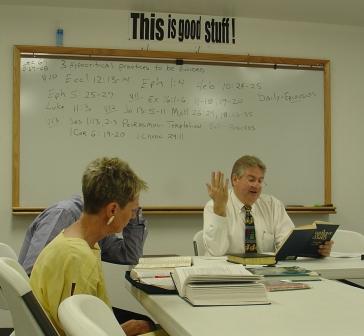Monday, May 15, 2006
THE CONTRAST
V43. Simon answered and said, "I suppose the one whom he forgave more." And He said to him, "You have judged correctly."
We gain insight into Simon’s attitude when he said, “I suppose.” Hendriksen labels him having a spirit of indifference, real or feigned. The Pharisee is wondering what Jesus is trying to prove. Jesus has proven that He does know this woman’s past and present condition. He also knows what Simon says to himself proving that He is a prophet able to discern hearts and minds.
Simon’s supposition is correctly ascertained in that the one whom is the most forgiven loves the forgiver more.
Vv. 44-46. And turning toward the woman, He said to Simon, "Do you see this woman? I entered your house; you gave Me no water for My feet, but she has wet My feet with her tears, and wiped them with her hair. 45. "You gave Me no kiss; but she, since the time I came in, has not ceased to kiss My feet. 46. "You did not anoint My head with oil, but she anointed My feet with perfume.
Luke paints us a picture telling us that Jesus, rolling away from the table, and turning toward the woman, He said to Simon. We can see this woman with red eyes, nose, and cheeks complete with matted up hair from Christ’s dirty feet through His eyes. Focused upon the woman He speaks to Simon and said, "Do you see this woman?” This is a rhetorical question; of course he can see her. The jest is that Simon sees her as she was and Jesus can see what she has become.
At this point Jesus draws a comparison between the master of the house and the perceived harlot. Jesus says to Simon, I entered your house; you failed to offer me common hospitality; you gave Me no water for My feet, but she has wet My feet with her tears, and wiped them with her hair. (This woman was acting impulsively having no other resource than her own hair and tears to soothe the feet of her Savior.)
The second indictment: “You gave Me no [customary] kiss; but she, since the time I came in, has not ceased to kiss My feet.” The custom upon entry into one’s home was the kiss on the cheek viewed similar to our handshake. The kiss on the cheek was somewhat natural but to kiss one’s feet was symbolic of supreme adoration.
The third indictment: "You did not anoint My head with oil, but she anointed My feet with perfume.” Simon the Pharisee, the religious leader of the banquet of religious leadership, couldn’t even display common courtesy but this ex-common street whore sees her only hope in the one whom is getting the least respect from the “God people”. She renders the finest perfume for Christ’s feet whereas Simon would not even anoint His head with simple olive oil.
We gain insight into Simon’s attitude when he said, “I suppose.” Hendriksen labels him having a spirit of indifference, real or feigned. The Pharisee is wondering what Jesus is trying to prove. Jesus has proven that He does know this woman’s past and present condition. He also knows what Simon says to himself proving that He is a prophet able to discern hearts and minds.
Simon’s supposition is correctly ascertained in that the one whom is the most forgiven loves the forgiver more.
Vv. 44-46. And turning toward the woman, He said to Simon, "Do you see this woman? I entered your house; you gave Me no water for My feet, but she has wet My feet with her tears, and wiped them with her hair. 45. "You gave Me no kiss; but she, since the time I came in, has not ceased to kiss My feet. 46. "You did not anoint My head with oil, but she anointed My feet with perfume.
Luke paints us a picture telling us that Jesus, rolling away from the table, and turning toward the woman, He said to Simon. We can see this woman with red eyes, nose, and cheeks complete with matted up hair from Christ’s dirty feet through His eyes. Focused upon the woman He speaks to Simon and said, "Do you see this woman?” This is a rhetorical question; of course he can see her. The jest is that Simon sees her as she was and Jesus can see what she has become.
At this point Jesus draws a comparison between the master of the house and the perceived harlot. Jesus says to Simon, I entered your house; you failed to offer me common hospitality; you gave Me no water for My feet, but she has wet My feet with her tears, and wiped them with her hair. (This woman was acting impulsively having no other resource than her own hair and tears to soothe the feet of her Savior.)
The second indictment: “You gave Me no [customary] kiss; but she, since the time I came in, has not ceased to kiss My feet.” The custom upon entry into one’s home was the kiss on the cheek viewed similar to our handshake. The kiss on the cheek was somewhat natural but to kiss one’s feet was symbolic of supreme adoration.
The third indictment: "You did not anoint My head with oil, but she anointed My feet with perfume.” Simon the Pharisee, the religious leader of the banquet of religious leadership, couldn’t even display common courtesy but this ex-common street whore sees her only hope in the one whom is getting the least respect from the “God people”. She renders the finest perfume for Christ’s feet whereas Simon would not even anoint His head with simple olive oil.
